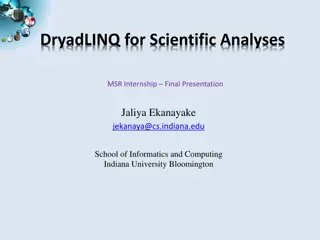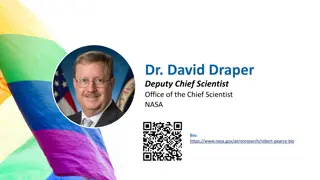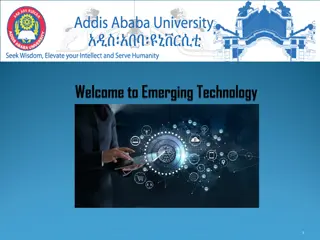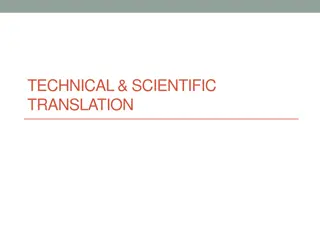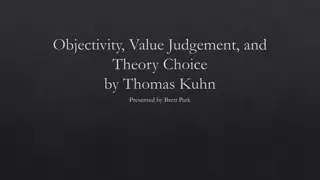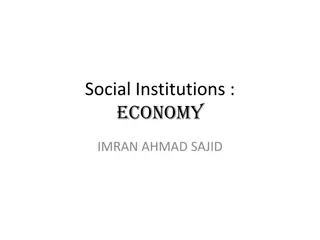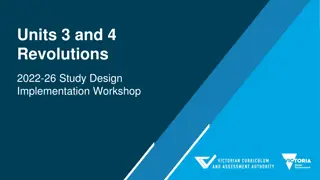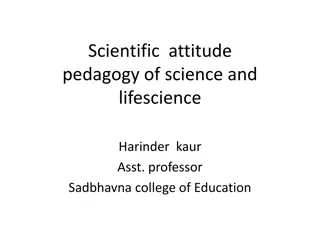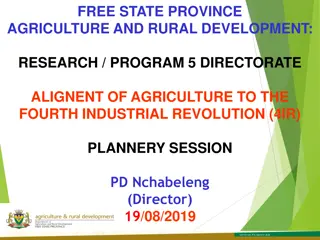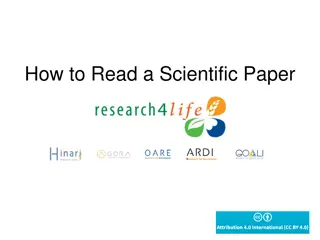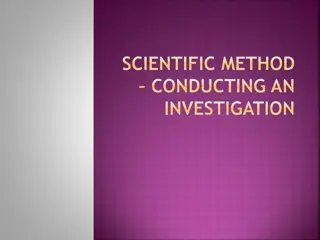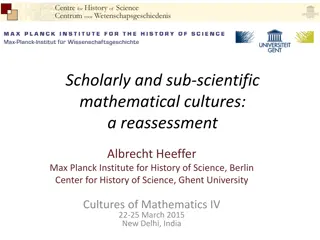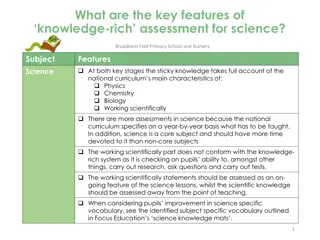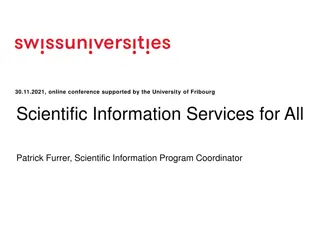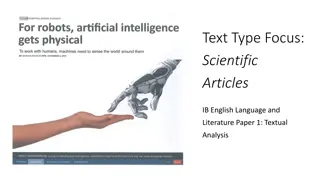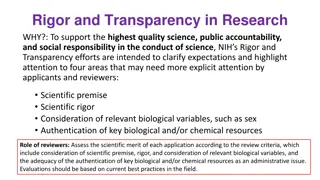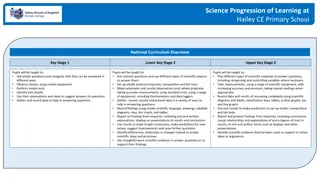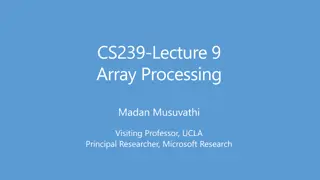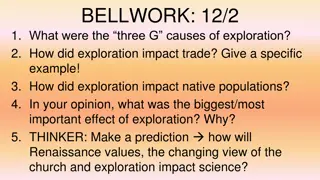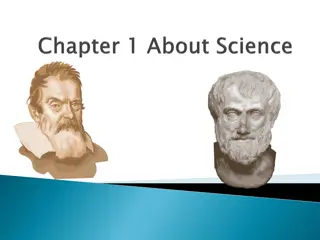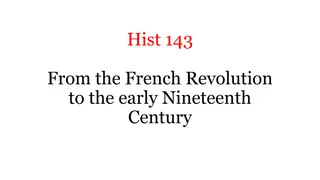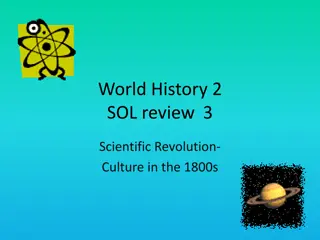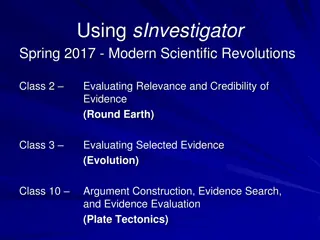Enhancing Scientific Literacy in Early Years Play-Based Learning
This PhD research proposal explores scientific literacy among children in play-based learning, focusing on everyday concepts and their application to scientific understanding. The study aims to implement Vygotsky's sociocultural theory to enhance children's scientific literacy through Vision 1 and V
7 views • 19 slides
Exploring the PROTEOCURE COST Action: Targeting Proteolysis for Proteome Remodeling
The PROTEOCURE COST Action focuses on targeting proteolysis for proteome remodeling, aiming to enhance Europe's scientific and technological capacity through collaboration across various fields and career stages. Participating in this initiative offers financial support, scientific networking, and c
0 views • 17 slides
Evolution of Industrial Revolutions Towards Industry 4.0
Key Enabling Technologies (KET) play a crucial role in revitalizing production systems by fostering technological advancements through research experiences. Industry 4.0 signifies a transformative phase with new technologies, production factors, and work structures reshaping the manufacturing landsc
13 views • 60 slides
Understanding Climate Change through Scientific Inquiry
Explore the role of science in addressing climate change, identifying scientific questions, discussing different disciplines involved, and analyzing the strength and limitations of scientific methods. Engage in activities to understand how scientific questions are formulated and categorized for inve
2 views • 22 slides
Evaluation of DryadLINQ for Scientific Analyses
DryadLINQ was evaluated for scientific analyses in the context of developing and comparing various scientific applications with similar MapReduce implementations. The study aimed to assess the usability of DryadLINQ, create scientific applications utilizing it, and analyze their performance against
0 views • 20 slides
Overview of NASA's Office of the Chief Scientist and Deputy Chief Scientist Dr. David Draper
The Office of the Chief Scientist (OCS) at NASA plays a vital role in advising, advocating, and representing the agency in various scientific matters. Dr. David Draper serves as the Deputy Chief Scientist. The OCS leads initiatives related to scientific integrity, research security, citizen science,
2 views • 11 slides
Understanding the Scientific Method in Measurements and Calculations
Explore the scientific method in detail, including observing, collecting data, formulating hypotheses, testing hypotheses, and formulating theories with practical examples. Understand the importance of experimentation and how it leads to the development of scientific theories. Engage in activities t
6 views • 43 slides
Evolution of Technologies: A Journey Through Revolutions
Explore the evolution of technologies through different revolutions - from the agricultural revolution to the emerging technologies of the future. Learn about the profound changes in economic relationships and technological conditions that have shaped human society. Discover the role of data, progra
0 views • 58 slides
Understanding Scientific Translation: A Vital Tool for Advancing Knowledge
Scientific translation is a specialized practice that involves accurately translating complex terms in fields such as science and technology to facilitate global knowledge exchange and advancement. It requires precision, fidelity to source material, and a deep understanding of technical terminology
0 views • 60 slides
Objectivity, Value Judgement, and Theory Choice in Science
Thomas Kuhn's work explores the subjective elements in theory choice, highlighting that theory selection is not solely based on objective algorithms. He discusses the structure of scientific revolutions, where science shifts between normal and revolutionary phases. Kuhn's ideas have faced criticisms
6 views • 19 slides
Evolution of Economic Institutions Through Technological Revolutions
Economies of modern nations have evolved over centuries through technological revolutions. The Agricultural Revolution led to the creation of a distinct economy with surplus production, job specialization, and trade. The Industrial Revolution further transformed production, leading to significant in
1 views • 35 slides
Study Design for Units 3 and 4 Revolutions 2022-26 Workshop
Explore the study design and implementation for Units 3 and 4 Revolutions focusing on key areas like causes and consequences of revolutions in countries such as Russia, China, America, and France. The workshop emphasizes acknowledgment of traditional custodians and offers teaching ideas, questions f
0 views • 29 slides
Understanding Scientific Attitude and Pedagogy of Science
Scientific attitude involves open-mindedness, curiosity, rationality, and a desire for accurate knowledge. It includes characteristics such as critical thinking, respect for diverse viewpoints, and a reliance on verified information. Developing a scientific attitude involves studying superstitions,
1 views • 6 slides
Evolution of Industrial Revolutions in Agriculture: Free State Province Research & Program Director's Plannery Session
The presentation delves into the alignment of agriculture with the Fourth Industrial Revolution (4IR) in the Free State Province, tracing the evolution from the first to the third industrial revolutions. It discusses the advantages, disadvantages, impacts, competitiveness, opportunities, and threats
0 views • 31 slides
Guide to Reading Scientific Papers
Understanding how to read a scientific paper is crucial for researchers and students alike. This guide covers the types of scientific papers, organization of a paper, and the key steps to properly read and comprehend complex scientific information. It explains the different sections of a paper, such
0 views • 20 slides
Understanding the Scientific Method: A Comprehensive Guide
Exploring the scientific method and principles of scientific investigation, this guide covers the mindset of a scientist, steps in the scientific method, and key components like formulating questions, conducting research, creating hypotheses, performing experiments, and analyzing results. It emphasi
1 views • 21 slides
Explore the Scientific Revolution
The Scientific Revolution marked a shift from the medieval worldview to a secular, rational, and materialistic perspective. Key terms such as geocentric and heliocentric conceptions, Cartesian dualism, rationalism, and the scientific method played pivotal roles in shaping this transformative period.
7 views • 10 slides
Understanding Taxonomy and Scientific Classification
Explore the world of taxonomy and scientific classification, from the discipline of classifying organisms to assigning scientific names using binomial nomenclature. Learn the importance of italicizing scientific names, distinguish between species, and understand Linnaeus's system of classification.
0 views • 19 slides
Latin American Revolutions: Causes, Events, and Impact
Latin American Revolutions from 1791 to 1825 marked a period of significant upheaval as colonies in the Western Hemisphere sought independence from Spanish rule. Driven by factors like inspired by other successful revolutions, Spanish mercantilist policies, and unequal wealth distribution, these rev
1 views • 12 slides
The Berlin Revolutions of 1848: A Historic Perspective
The Berlin Revolutions of 1848 were part of a series of widespread uprisings across Europe, driven by a mix of liberal and working-class goals. The revolutions aimed to challenge the existing autocratic political structure in the German Confederation and the Austrian Empire. Despite initial hopes fo
1 views • 14 slides
Two Revolutions in Russia: The March and November Revolutions of 1917
The year 1917 witnessed two significant revolutions in Russia - the March Revolution leading to the abdication of the Tsar and the formation of the Provisional Government, followed by the November Revolution where Lenin's Bolsheviks overthrew the Provisional Government and established the world's fi
0 views • 20 slides
A Comparative Analysis of the American and French Revolutions
The American and French Revolutions were significant events during the late 18th century. Both revolutions were driven by Enlightenment ideals, concern for liberty, and push for new governance but had differences in violence, outcomes, and influence. While the American Revolution led to independence
0 views • 9 slides
Reassessing Scholarly and Sub-Scientific Mathematical Cultures
Scholarly and sub-scientific mathematical cultures are reevaluated through the works of Jens Hoyrup, focusing on the organized nature of sub-scientific knowledge. The distinction between theoretical and practical knowledge, applications to mathematical cultures, and misconceptions related to the sup
0 views • 53 slides
Key Features of Knowledge-Rich Assessment for Science at Broadbent Fold Primary School
Sticky knowledge in science assessment at Broadbent Fold Primary School encompasses Physics, Chemistry, Biology, and Working Scientifically. Assessments are detailed due to the structured national curriculum, with a focus on specific scientific vocabulary and practical applications. The ongoing asse
0 views • 20 slides
Scientific Services for All - Enhancing Scientific Information and Services
This online conference, supported by the University of Fribourg, focuses on providing scientific information and services for all. Led by Patrick Furrer, the Scientific Information Program Coordinator, the event delves into creating a network of services, developing a coordination structure, and sho
0 views • 12 slides
Quiz Review on Scientific Method and Graphing
Explore a quiz review covering topics related to scientific method, graphing, and experimental design. Understand key concepts such as hypothesis, scientific law, theory, variables, and experimental control through detailed questions and images. Test your knowledge on laboratory safety, inferences,
0 views • 14 slides
Unveiling the Art of Scientific Article Writing
Delve into the world of scientific articles in IB English Language and Literature Paper 1. Understand the purpose, use of language, comparisons, and visuals in scientific writing. Explore how these elements engage readers and simplify complex concepts through examples like stethoscopes and swamp wat
0 views • 9 slides
Fusion Science Department Enabling Research Projects 2021-2023
The Fusion Science Department Enabling Research Projects for 2021-2023 focus on developing novel fusion-relevant scientific and technological ideas. These projects, led by Principal Investigators, are distinct from main work packages and involve scientific planning, team collaboration, and resource
0 views • 11 slides
Enhancing Research Quality through Rigor and Transparency Initiatives
NIH's Rigor and Transparency efforts aim to uphold the highest standards in research, ensuring scientific premise, rigor, consideration of relevant biological variables, and authentication of key resources. Reviewers play a critical role in assessing these aspects to support robust and accountable s
0 views • 9 slides
Science Progression of Learning at Hailey CE Primary School Overview
This curriculum overview outlines the scientific learning progression for pupils at Hailey CE Primary School across Key Stage 1, Lower Key Stage 2, and Upper Key Stage 2. It details the development of scientific skills and knowledge, from asking simple questions and making observations to planning a
0 views • 11 slides
Nationalist Revolutions in Latin America: 1789-1900
Rising nationalism in Latin America during the late 1700s and early 1800s led to revolutions against European colonial powers. Inspired by Enlightenment ideals and events such as the American and French Revolutions, Latin Americans sought self-government and independence. The Haitian Revolution in 1
1 views • 28 slides
SciDB: Revolutionizing Data Management for Scientific Analytics
SciDB is an open-source analytical database designed to meet the complex data management needs of the scientific community. It offers a unique array-based data model that supports advanced linear algebra operations crucial for scientific analytics. By addressing the limitations of traditional relati
0 views • 39 slides
Impact of Exploration and Scientific Revolution on Society
Exploration in the age of discovery was driven by economic, political, and religious motives, impacting trade and native populations while leading to significant scientific advancements and changes in societal beliefs. The Scientific Revolution challenged traditional views with new scientific method
0 views • 19 slides
Evolution of Family Law: Adapting to the Needs of Children in Modern Times
Over the past 40 years, family law has undergone significant changes worldwide to better cater to children's needs post-divorce. Two major divorce revolutions have shaped this evolution, emphasizing the importance of balancing parental involvement with child protection. The shift from a focus on aut
0 views • 19 slides
Understanding the Scientific Method: Pre-Test and Daily Agenda
Explore the process of science with a pre-test on the scientific method, followed by a detailed daily agenda covering activities like bell-ringers, reviews, and experimental design. Understand the nature of science, scientific reasoning, and the importance of variables, groups, and constants in inve
0 views • 51 slides
Overview of Democratic Transitions and Revolutions
Explore the historical context of democratic transitions from the 1940s to 2020, including the waves of democracy as described by Huntington. Learn about bottom-up and top-down transitions, exemplified by mass protests in East Germany leading to German reunification. Delve into the complexities of p
0 views • 73 slides
Evolution of Scientific Thought and the Scientific Method
Explore the evolution of scientific theories and methodologies through the works of influential figures like Aristotle, Copernicus, Galileo Galilei, and Francis Bacon. From the geocentric beliefs of Aristotle to the heliocentric model proposed by Copernicus, witness the shift in paradigms and the em
0 views • 14 slides
Europe from French Revolution to Revolutions of 1848
From the French Revolution to the early nineteenth century, Europe saw significant political changes, including the rise of Napoleon Bonaparte, the Congress of Vienna in 1815, and subsequent revolutions like the 1830 French Revolution and the Revolutions of 1848 that spread across Europe, shaping th
0 views • 6 slides
The Enlightenment and Absolutism: Key Concepts and Figures
The period saw significant developments, including the Scientific Revolution emphasizing reason and systematic observation, leading to the expansion of scientific knowledge. Absolutism showcased monarchs' control, like Peter the Great's westernization of Russia and Louis XIV's Palace of Versailles.
0 views • 22 slides
Mastering Evidence Evaluation in sInvestigator Spring 2017
Dive into the world of evidence evaluation using the sInvestigator tool in the Modern Scientific Revolutions class. Explore topics like Evolution and Plate Tectonics, learn to assess relevance, credibility, author competence, and more through practical exercises. Enhance your understanding of scient
0 views • 17 slides




